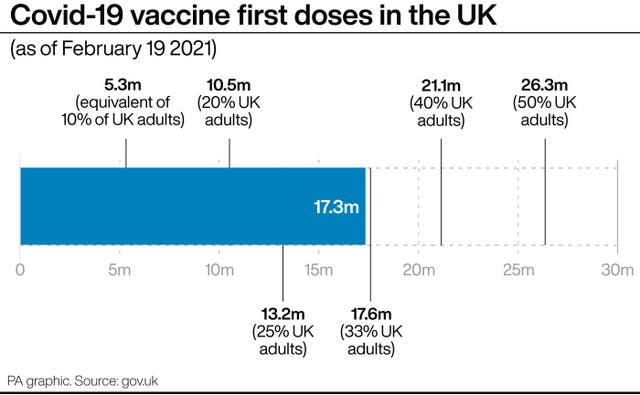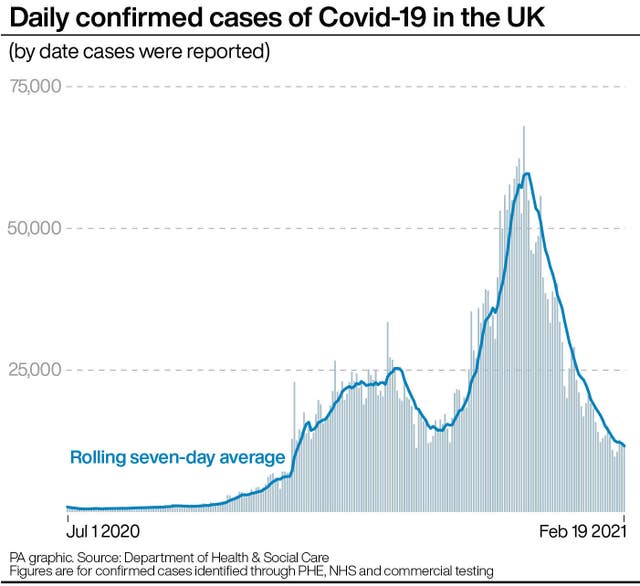Outdoor family gatherings could be allowed within weeks as lockdown eases
Care home residents will be allowed to hold hands with a regular indoor visitor from March 8 under the Government’s plans.

Outdoor family reunions could be allowed within weeks while care home residents will be able to hold hands with a loved one again under the Government’s road map for easing coronavirus restrictions.
Downing Street said it wanted to make social contact easier as soon as possible as Prime Minister Boris Johnson spends the weekend finalising plans for relaxing measures in England.
Several newspapers reported that new rules allowing two households to meet outdoors – regardless of the total number of people – are set to be introduced from April, while six people from six different households would also be able to gather.
Number 10 dismissed as speculation reports that pubs could be permitted to serve customers outdoors from April, with the Daily Mail saying that people could be served indoors in May.
Schools look set to reopen to all pupils from March 8, with both primary and secondaries said to return in just over three weeks.
The move comes despite a coalition of education unions and professional bodies warning that a full return of all pupils would be a “reckless” course of action.
A relaxation of the rules around care home visits has been given a cautious welcome by the sector, with calls for clarification on the details of the new arrangements.
Care home residents will be allowed to hold hands with a regular indoor visitor from March 8 under the Government’s plan to ease lockdown restrictions in England.
Visitors will be required to take a coronavirus lateral flow test – which gives quick results – before entry and personal protective equipment (PPE) must be worn.
Residents will be asked not to hug or kiss their relatives, and guidance for care homes is expected to be published in the next fortnight.
Health Secretary Matt Hancock said he was “pleased” that it would soon be possible for people to be “carefully and safely reunited with loved ones who live in care homes”.

In other developments:
– A further 445 people died within 28 days of testing positive for Covid-19 as of Saturday, while there were another 10,406 lab-confirmed cases of coronavirus in the UK.
– More than 17.2 million people have now received their first dose of a coronavirus vaccine, while more than 600,000 people have received their second, according to the Government’s figures.
– A 16-year-old with no known underlying health conditions was among the latest reported deaths of people who have tested positive for coronavirus in England.
Mr Johnson will set out the blueprint for relaxing measures in England on Monday – the final details of which will be agreed at a meeting of the “Covid O” committee on Sunday.

The Prime Minister will then chair a meeting of his Cabinet on Monday, before announcing the plans to the Commons later that afternoon.
He is expected to lead a Downing Street press conference that evening alongside England’s chief medical officer Professor Chris Whitty and scientific adviser Sir Patrick Vallance.
The relaxation comes amid a backdrop of promising data suggesting coronavirus infections are dropping across the UK.
Around one in 115 people in private households in England had Covid-19 between February 6 and 12, the Office for National Statistics (ONS) said, down from around one in 80 people from January 31 to February 6.
Meanwhile, in Wales, around one in 125 people are estimated to have had Covid-19 between February 6 and 12, down from one in 85 previously.
In Northern Ireland, the figure is around one in 105 people, down from one in 75, while in Scotland it is around one in 180 people, down from one in 150.
The data, which does not cover care homes and hospitals, is based on swab tests from thousands of people regardless of whether or not they have symptoms.
Elsewhere, new analysis from Oxford University published in The Lancet confirmed that a single dose of the AstraZeneca vaccine offers 76% protection against Covid-19 from 22 days after vaccination, and that this had not waned by the three-month mark.
The UK policy of leaving up to 12 weeks between doses also resulted in a higher efficacy overall, the study found.





